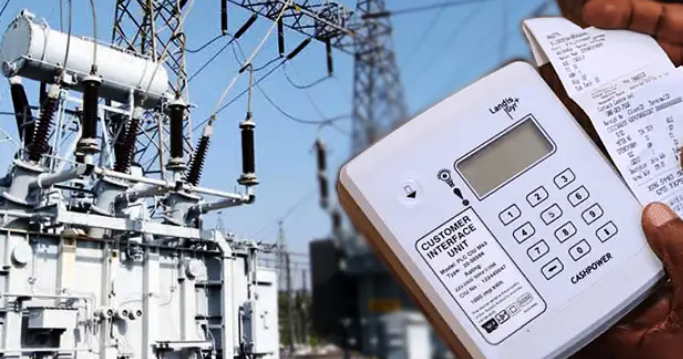News
Epileptic Power Supply: FG To Unbundle 11 Discos, Orders Sale Of Four

Power distribution companies in Nigeria are currently being unbundled along state lines due to their large sizes which often result in inefficiency and ineffectiveness, the Federal Government declared on Monday.
It stated that the privatisation of the firms would not be reversed, but stressed that the Discos would be broken into more efficient structures along state lines so as to be able to deliver on their mandates.
This came as the Federal Government also ordered the sale of Discos that have been taken over by banks and the Assets Management Corporation from its original investors/owners.
Currently, four Discos are under the management of banks and AMCON.
Abuja Electricity Distribution Company is under the management of the United Bank of Africa (UBA), while Fidelity Bank manages Benin Electricity Distribution Company, Kaduna Electricity Distribution Company, and Kano Electricity Distribution Company.
The Ibadan Electricity Distribution Company is under the AMCON management.
The four Discos are under these new managements due to their inability to repay their loans to the financial institutions.
The government stated that those who acquired the Discos when the firms were officially privatised in November 2013, lacked the required expertise and financial capacity to run the companies.
This came as the Senate Committee on Power lambasted the Discos for being so inefficient since they took over the privatised assets over 10 years ago, and called for the overhaul of the power firms.
In his address, while playing host to the Senate Committee on Power, led by their Chairman, Senator Eyinnaya Abaribe, the Minister of Power, Adebayo Adelabu, stated that the Federal Government had commenced the restructuring of Nigeria’s 11 power distribution companies.
He also revealed that over 100 projects of the Transmission Company of Nigeria have not been completed since 2001, a period of about 23 years.
Adelabu said, “We are unbundling the Discos along state lines. Some of the Discos are too big for efficiency. They are too big for effectiveness. Ibadan Disco covers seven states. It is practically impossible for them to be efficient.
“So we are rearranging and restructuring the Discos along state lines so that each state government will know the responsible Disco for their states. Also, the federal and state governments should start exercising their rights in the operation and management of the Discos because we still own 40 per cent in the firms.
“But we have left it for the private sector operators for too long and they have messed it up. So the government must come back to take over its own right in the Discos. We are also planning to franchise the unserved communities under the Discos.”
The minister went ahead to state that “we will start seeing regulations about franchising. The fact you are Eko Disco doesn’t mean that you cannot have smaller Discos that are ready to invest in your unserved communities. So we are looking at franchising.”
Adelabu further revealed that the Oyo State Government had written to the Federal Government stating that it wants to exercise its rights in Ibadan Disco.
He said the Nigerian Electricity Regulatory Commission has been made to realise that it must sanction Discos that fail to perform, as the licences of some of the power firms might be withdrawn for non-performance.
We are transforming the Discos and very soon you’ll see that a lot of tough decisions will be taken against these Discos because they are the last mile in the sector. If they don’t perform then the entire sector is not performing.
“So we have put pressure on NERC to make sure that it raises the bar on the activities of the Discos. If it has to withdraw licences for non-performance, why not? If it has to change the boards and managements, why not?
“And all the Discos that are still under AMCON (Asset Management Corporation of Nigeria) and some lenders (banks), within the next three months they must be sold to a technical power operator with a good reputation in utility management.
We can no longer afford AMCON to run our Discos. We can no longer afford the banks to run our Discos. This is a technical industry and it must be run by technical experts,” the power minister stated.
Also commenting on the non-performance of Discos, a member of the committee, Senator Danjuma Goje said, “The Discos have not added anything significant to the power sector, but are just going about collecting money.
The Discos are complete failures and should be overhauled. They have failed to live up to expectations and we have so many complaints about their poor performances.”
The Senate committee also authorised an investigative hearing on the electricity tariff hike and stated that this would be held on April 29, 2024, at the Senate.
Privatisation problems
The power minister told his guests that those who acquired the Discos when they were privatised, lacked the required expertise and financial capacity.
Adelabu said, “Our problem started from the privatisation era. Not that the privatisation has a problem in itself, but its implementation and execution have robbed the process of its laudable objectives.
“We believe that people who bought the power companies do not have the required expertise to run the utility firms. Secondly, they were not buoyant enough in terms of financial buoyancy to pay for the power plants.
“All of them used bank loans to pay for the assets. And we all know that the power business is a long-term business. It is not something you recoup your capital and make profit in a short time. So they were all under pressure to repay the bank loans that they used to acquire the power companies.
“This is why today a number of them have been taken over by their lenders, either AMCON or the banks, both local and international banks. They also promised to invest and enhance the distribution network, but they did not do this.”
The minister stated that the investors had promised to reduce the losses in the Discos, but stressed that up till now the losses had remained at about 40 per cent across the power value chain.
“So the Discos are not investing as expected,” Adelabu stated.
100 uncompleted projects
The minister told the lawmakers that over 100 power transmission projects have not been completed since 2001.
“Since 2001 till date we have over 100 uncompleted projects of the Transmission Company of Nigeria. So when we say the government has spent so much in the sector, it is true. But all the spendings have not translated to good impact on power users.
“This is because majority of these projects have not been completed, though some of them are 80 or 90 per cent completed. We have over 65 projects on power substations that are still ongoing since 2001, which is 23 years ago.
“We have about 62 lines projects across the country that were started and have not been completed. And these are being affected by exchange rate calculations, inflation, variations, etc. One thing about power projects is that if they are not completed 100 per cent, you cannot energize them,” Adelabu stated.
He said all the investments are just there lying in waste, “but we are saying that this year we must ensure that a significant number of these projects are completed so that Nigerians can enjoy the investments in the transmission company.”
On the metering gap in the power sector, the minister stated that a company received $200m in 2003 to provide three million meters but failed to do so.
“In 2003, the metering gap was less than four million meters and the Federal Government gave out $200m to a particular company to acquire three million smart meters for the industry. It was a revolving loan.
But it is sad to let you know that this is 21 years after, no single meter was acquired by this company and the $200m which was N32bn at the time, nothing was got from the money until Mr President just gave us the approval to terminate this loan.
“He also asked us to implement the metering of the Nigerian Army formations to the tune of N12bn. You can imagine if we had acquire three million meters 21 years ago. Today the metering gap that we have is over eight million out of over 12 million customers of the power sector,” the minister stated.
Adelabu, however, noted that the Federal Government was working hard to close the metering gap.
Mr President has come to our aid on this by forming a Presidential Metering Council, which I’m the Chairman, and he has given us a mandate that a minimum of two million meters should acquired and distributed to Nigerians every year.
“This is going to continue till the next four to five years, so that the current eight million metering gap that we have will be closed over the next four to five years.
“The funding for this project is being sourced. We have been given a seed capital of N75bn and the Nigeria Sovereign Investment Authority is coming to our aid in terms of capital for this,” Aselabu stated.
The minister also stated that the target of the Federal Government is to achieve 6,000MW of power before the end of this year, adding that this has been submitted to the President.
He called for the payment of the outstanding debts to gas companies and power generation firms.
He said the government is currently talking with two investors that should invest in the construction of 3,000MW of solar-power projects in various states to support the national grid.
The minister pointed out that Nigeria currently has an installed power generation capacity of about 14,000 megawatts.
He said, “Today we have a total of 13,250MW installed capacity in all the generating units, including hydro plants and thermal plants. If we add the 700MW coming from the recently Zungeru plant we will have close to 14,000MW installed capacity.
“But it is sad to let you know that the highest we have ever generated in this sector is 5,800MW out of an installed capacity of over 13,000MW, which is less than 50 per cent. The infrastructures are there lying fallow without adequate maintenance and the turbines are getting rusty.
“Two things are responsible, which include the inadequate transmission capacity to evacuate this power even when it is generated. The second thing is the inadequate demand coming from the Discos because they are not getting full payments from the consumers when they distribute power to them.”
Adelabu said the 5,800MW was generated in March 2021, which was over three years ago.
“But we believe that with good investments and demand for power, we can increase power generation to over 8,000MW once there is adequate infrastructure,” he stated.
PUNCH
News
NUJ-FCT Elections: Comrade Ike To Flag-Off Campaign With Free Medical Checks, Treatment


News
President Tinubu Leaves Brazil After G20 Summit

President Bola Tinubu has departed Galeao Air force Basa (SBGL) Airport, Rio de Janeiro, Brazil, on Saturday, for Abuja after attending the 19th G20 Leaders Summit in Rio de Janeiro, Brazil.
The President is due to arrive at the Presidential Wing of Nnamdi Azikiwe International Airport, Abuja, at 10.00 p.m. (Nigerian time).
President Tinubu had attended the G20 Leaders summit where he endorsed the global alliance against hunger and poverty, which he said was pivotal.
The President also held bilateral talks with Kristalina Georgieva, the Managing Director of the International Monetary Fund (IMF), who commended his administration’s economic reforms and their positive indicators.
He also presided over the signing of a 2.5 billion dollar Letter of Intent between the Nigerian government and the JBS S.A., a Brazilian company and one of the top three largest meat processing companies in the World.
The president was accompanied in the trip by senior government officials including the minister of foreign affairs yusuf Tuggar, the national security adviser, Nuhu RIBADU and many others.
News
HoR to lead historic march, other Key initiatives against gender-based violence

In commemoration of this year’s International Day for the Elimination of Violence Against Women, the House of Representatives will lead a landmark march on Monday, November 25, 2024, along with other strategic activities as part of its unwavering commitment to eradicating gender-based violence (GBV) in Nigeria.
This was contained in a statement issued by the HoR spokesperson, Rotimi Akin, Jr on Saturday.
According to him the march, which starts at 8:00 AM, will bring together over 1,000 participants – including Representatives and members of the public – on a symbolic walk from the National Assembly to the Headquarters of the Nigeria Police Force.
This demonstration of solidarity will culminate in the submission of a petition to the Inspector General of Police, demanding decisive action to safeguard vulnerable populations and ensure accountability for perpetrators of GBV.
“This march and the associated activities are not just symbolic gestures, they reflect our resolve and call to action against gender-based violence head-on,” said Hon. Abbas Tajudeen,, Speaker of the House of Representatives.
“We stand united in the fight to protect the rights and dignity of all Nigerians, especially the most vulnerable. Together, through collective action and legislative reforms, we can build a society where safety, justice, and equality prevail.”
Beyond the march, the 10th House of Representatives in alignment with its Legislative Agenda (2023 – 2027) has outlined *key activities to sustain awareness and action throughout the 16 Days of Activism:*
1. *Sash Demonstration Ceremony* – Tuesday, November 26, 2024
Members of the House will don orange sashes, symbolising solidarity with the fight against GBV, during plenary sessions throughout the campaign period.
2. *Convergence of State Assembly Speakers* – Monday, December 9, 2024
A strategic meeting at the Transcorp Hilton, Abuja, will bring together Speakers of State Houses of Assembly to discuss legislative strategies for combating GBV nationwide.
3. *National Citizens’ Summit and GBV Conference 2024 -* Tuesday, December 10, 2024
This summit will conclude the 16 Days of Activism with discussions on constitutional reforms and securing endorsements for gender equality initiatives championed by the House.
The House of Representatives invites all Nigerians to *participate in this historic march on Monday, November 25, 2024.* Participants will receive orange T-shirts—the official colour of the United Nations campaign to end violence against women—symbolising hope for a future free of violence.
*Details of the March:*
• *Date:* Monday, November 25, 2024
• *Time:* 8:00 AM
• *Starting Point:* Speaker’s Car Park, National Assembly
• *End Point:* Nigeria Police Force (NPF) Headquarters
Gender-based violence continues to devastate families and communities across Nigeria. The 10th House of Representatives however, remains steadfast in driving systemic reforms, fostering collaboration, and championing accountability to address this pervasive issue.
Together, let us take a decisive stand for justice, equality, and the protection of human rights, paving the way for a safer, more equitable Nigeria.
-

 Metro11 hours ago
Metro11 hours agoBusinessDay Journalist Finally Regains Freedom From ‘One-Chance’ Kidnappers In Abuja
-

 Metro16 hours ago
Metro16 hours agoCourt remands 113 foreigners over alleged cybercrime
-

 Metro11 hours ago
Metro11 hours agoPolice recover stolen SUV after gun duel with robbers in Abuja
-

 News17 hours ago
News17 hours agoFull List: Innoson, Mitsubishi, Dantama , Others – CAC Delists 80,000 Companies
-

 Metro17 hours ago
Metro17 hours agoGunmen kidnap journalist’s relatives, demand N50m ransom
-

 News17 hours ago
News17 hours agoJapa: We’ve discovered over 10,000 fraudulent foreign student acceptance letters – Canadian Authorities
-

 News17 hours ago
News17 hours agoFG reinstates Ikechebelu and Modebelu as UNIZIK Acting VC and Registrar
-

 News11 hours ago
News11 hours agoFG insists Rivers State funds is intact was never stopped








